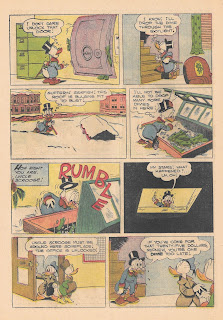Redartz: Some of the first comics I ever read, and loved, were Walt Disney books featuring the adventures of Donald Duck, his nephews Huey, Dewey and Louie, and Donald's financially obsessed Uncle Scrooge McDuck. These stories grabbed my youthful imagination, and held me fast even through the teen years and on into adulthood. Indeed, there were times when I stopped buying superhero comics, or dropped Archie comics, yet still maintained interest in these Disney Ducks. And much of the reason for that was the gargantuan influence of Carl Barks.
Carl Barks was the writer /artist for Donald Duck for decades, and was the creator of many beloved Disney characters, particularly Scrooge McDuck himself. Barks' storytelling skills are the stuff of legend; going way beyond the limited 'gag strips' that were found in some "funny animal" books. Barks told humorous tales, cautionary tales, morality tales, and usually with a hefty dose of adventure. How could any kid resist titles like "Ghost of the Grotto", "The Cave of Ali Baba", or "The Lost Crown of Genghis Khan"?
And the cast of characters Barks weaved into his 'Duck Tales': the Terrible Beagle Boys, Magica DeSpell, Gyro Gearloose, Flintheart Glomgold, just to name a few. Barks gave each character a unique voice and personality, and gave the world of Disney's Ducks a level of characterization rivaling that used later by Marvel. And that characterization certainly applied to the main cast: manipulative Scrooge, bemused Donald, and the nephews (who generally seemed the most rational and capable of the whole family).
But there was much more to Carl Barks than just his writing. His artwork is equally legendary; not for nothing was he known as "The Good Artist" (for years there were no credits for Disney creators, but his rendering stood out from the rest earning him that sobriquet). Barks was unparalleled at giving emotive expression to his characters.
He also excelled at , well, basically everything. He could beatifully render dramatic scenery,
animals,
bizarre monsters,
and intricate architecture.
There weren't many humor books in which you found artwork that you could pore over and admire, regardless of the story. Barks' work, in that regard, puts him among the greats of the comics genre: Eisner, Kirby, Wood. And I'm not overstating things here; Barks' work has stood the test of time. Each generation rediscovers these great stories. In the bronze age, we had Gold Key and Whitman. In the 80's Gladstone Publishing kept them in the comics shops. Still later Disney itself published the books, and today we have Boom! and Dark Horse.
 |
| Don Rosa's first Duck cover |
And what's more, there's more to it than simply representing the genius of Barks' work. Another artist/writer, Don Rosa, took on the Duck reins (where would one put reins on a duck?) in 1987 and brought a whole new tradition of excellence to books like Donald Duck, Uncle Scrooge and Walt Disney's Comics and Stories. Like Barks before him, Rosa worked with intricate storylines and equally intricate artwork. I've come to love Rosa's work too, to the extent that I'm currently awaiting delivery of a copy of Rosa's magnum opus: "The Life and Times of Scrooge McDuck"; a two-volume biography of the famous curmudgeon extrapolated from the whole history weaved by Barks. "Life and Times" won an Eisner for best story some years ago, and I'm finally going to enjoy it.
Which brings me to one final point: the availability of the Disney Duck stories. One great strength of Gold Key was the variety of formats they used to present these comics. The regular comic series were supplemented by Digests, Giants, and large format collections. This practice has continued to the present day, as we have unprecedented access to finely bound collections of Barks (and Rosa's) works.
To sum up: my love for the Disney ducks quite literally continues even today; a common reading thread that took me from childhood to grandparenthood! And chances are many among you are also fans of these books. Which is one way of saying it's time to hear from you; what are your thoughts about Donald, Scrooge, their creators, comics, casts, and all the rest? And while you compose those thoughts, here's some covers from the whole range of Duckdom...

















































